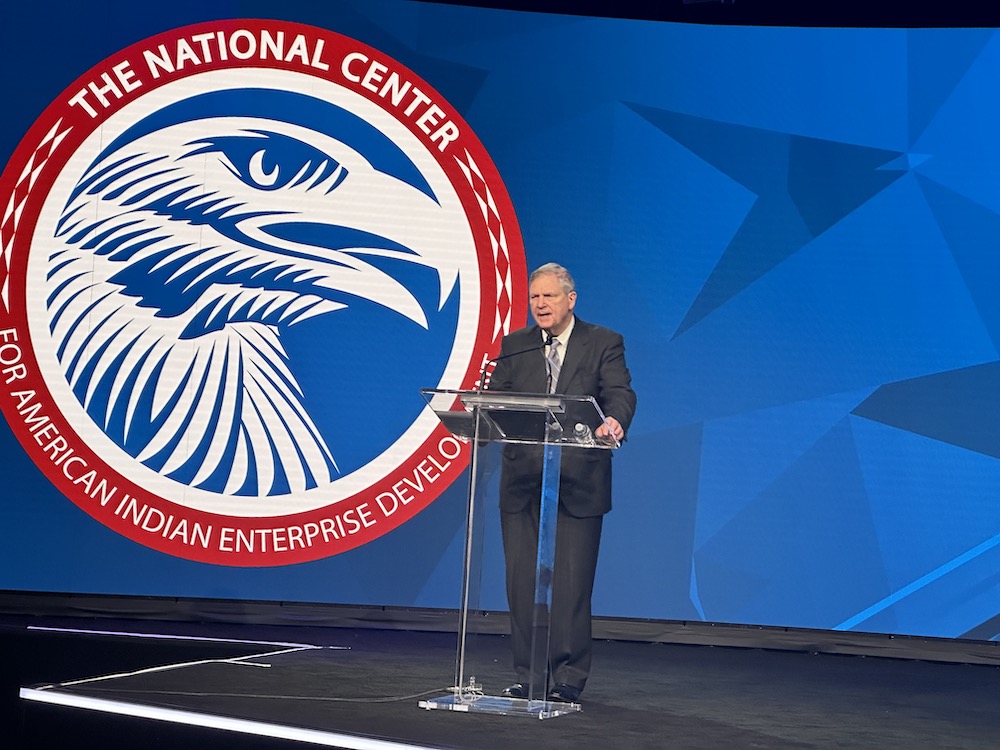
- Details
- By Brian Edwards, Chez Oxendine
- Economic Development
LAS VEGAS — Agriculture Secretary Tom Vilsack announced $58 million in new investments on three tribal reservations this morning.
The news came amid a flurry of announced policy changes and expansions during Vilsack’s remarks at the National Center for American Indian Enterprise’s Reservation Economic Summit (RES) in Las Vegas, Nevada.
The USDA will bolster water and broadband infrastructure in three tribal communities across Nevada, Oklahoma, and South Dakota through the Under the Water and Waste Facility Loans and Grants to Alleviate Health Risks on Tribal Lands Program and the ReConnect program.
“We support all of rural America, and you don’t get much more rural than Indian Country,” Vilsack said during his remarks.
In Nevada, the USDA issued a $772,000 grant to the Yomba Shoshone Tribe. That money will help replace a water tank, install water lines and fire hydrants, and improve access to safe water.
In South Dakota, the Oglala Sioux Tribe received $35 million from the ReConnect program to deploy a fiber-to-the-premises solution, bringing high-speed internet to 3,300 people as well as dozens of businesses, farms, and educational facilities.
In Oklahoma, $22 million in ReConnect monies will fund a similar project for the Choctaw Nation, in turn impacting 2,000 people, 12 businesses, and 100 farms.
“Under the Biden-Harris Administration, USDA is committed to tribal economic development and removing barriers for tribal nations,” Vilsack said. “When we invest in modern infrastructure for people who live in tribal communities, we create a ripple effect that impacts everyone. USDA is committed to building our economy from the middle out and bottom up by bringing high-speed internet, clean water and critical infrastructure to people in small towns and communities everywhere, especially in places that have been underserved for far too long.”
The ReConnect program has now awarded roughly $1.1 billion to 57 tribal communities amid a federal push to bring Indian Country online. The number of tribal communities applying for ReConnect projects surged 85 percent after the department removed the grant’s matching requirement for tribal applicants, Vilsack noted.
Round five of the ReConnect grant will begin receiving applications “very soon,” Vilsack told RES attendees.
The grant investments were part of a wider set of announcements delivered during Vilsack’s RES remarks. Other announcements during Vilsack’s presentation included expanding and clarifying tribal eligibility for the USDA’s Rural Business Development grant program, as well as the Community Facilities grant program, and removing an audit requirement from federal contracts through the department.
That audit requirement could be especially difficult for Native-owned small businesses, costing upwards of $20,000 to complete ahead of submitting a bid, Vilsack said. As federal contracting plays a larger role in the revenues for both tribal and Native-owned small businesses, removing the audit requirement should allow a wider pool of contractors to participate in USDA work.
Vilsack also announced that the ReConnect and Rural Electricity programs would now require a tribal resolution of consent before supporting any build outs on tribal reservation lands.
“We all know what a game changer broadband is. You can't grow modern tribal economies without internet connectivity,” Vilsack said, “but you can't have good public utilities without the consent of the people they're supposed to serve.”
Vilsack also touched on food sovereignty, pointing both to efforts to support tribal self-determination on food distribution through projects like a bison purchasing pilot program, and toward bolstering a growing, $6.5 billion tribal agricultural industry.
For example, Vilsack said, the USDA would be bringing tribal partners to Canada in June for the first Native Nations Trade Mission, an international trade show meant to showcase Native products to a wider audience. While the trade mission is the first of its kind under the USDA, a similar mission showcasing Native small businesses took place in June 2022, per prior Tribal Business News reporting.
“I'm asking you to work with us and partner with us as we strengthen the domestic food supply,” Vilsack said. “How can you work with us to expand meat processing facilities and distribution companies and restaurants and grocery stores? How can we help you purchase products for your businesses? How can we help you serve tribal produced products at your businesses?”
Vilsack’s remarks followed other USDA announcements throughout early 2024, including investments in energy, plant protection, and wildfire prevention. These efforts all represented a “commitment” by President Joe Biden’s administration to listening to and supporting Native producers, Vilsack said.
“This president and his administration and the USDA are committed to delivering for tribes. We're committed to doing so because it aligns with the values of this administration,” Vilsack said. “We want to make sure we can continue to do this good work in partnership with you. We need you, and we want to work with you to benefit all tribal areas.
“We want you to share with us what's working, and obviously what's not…this USDA is listening, and is making progress.”